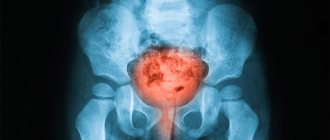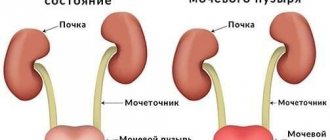Psychosomatics is a scientific branch that combines medicine and psychology.
Within its framework, the influence of psychological causes (stress, internal conflict, increased anxiety, etc.) on the development of diseases is studied.
The autonomic nervous system has a significant influence on the basic processes of the bladder. It is divided into the following departments:
- Parasympathetic . It is responsible for the protection and stable functioning of all organs, in particular it directly regulates the process of urination.
- Sympathetic . Encourages a person to take certain actions and helps him adapt to environmental conditions. In addition, it is this department that regulates the process of urinary retention.
With constant activity of the sympathetic department, there is increased nervous and physiological arousal, which affects the health of the body and, in particular, the functioning of the bladder. This fact leads to frequent and difficult urination.
What is cystitis?
Cystitis is inflammation of the bladder. Children and men are less susceptible to the disease. According to statistics, 9 out of 10 cases of cystitis occur among the fair sex.
Symptoms of cystitis:
- frequent, sudden urge to urinate;
- difficulty urinating;
- painful sensations when urinating (burning, stinging), discomfort.
Sometimes hyperthermia (fever) develops against the background of the disease. Cystitis manifests itself both independently and as a concomitant disease. It occurs under the influence of various factors.
Causes of cystitis from a medical point of view
There are many factors that lead to cystitis. Most often, the disease occurs due to infection of the body, hypothermia, and improper hygiene. There are other risk factors.
Causes of bladder inflammation:
- pregnancy;
- kidney diseases;
- frequent urinary retention;
- excess weight;
- use of vaginal deodorants, etc.
Such risk factors for the development of cystitis are widely known. But not everyone knows that cystitis can be caused not only by physiological disorders, but also by psychological reasons.
Possible forms
If cystitis recurs frequently, the disease has become chronic, or the examination does not reveal pathological changes, it is necessary to consider the psychological factor.
Chronic
This form of the disease occurs in a person who tries not to notice what causes irritation and anger. Because he ignores his needs, the normal functioning of the bladder is disrupted.
The psychosomatic causes of the disease are explained by the following factors:
- a person does not pay attention to his needs, he agrees with generally accepted concepts of happiness and success;
- envy;
- underestimation of personal qualities;
- frequent stress;
- unlived emotions.
Chronic cystitis occurs in a person who tries not to notice what causes irritation and anger.
Acute
Psychological causes of the acute form of pathology:
- a person is ready to endure the discomfort and pain of cystitis, avoiding taking responsibility for the events that happen in his life. Close people, concerned about his condition, do not demand anything;
- the patient expresses his protest against generally accepted rules and norms;
- pain indicates the strength of an event experienced in life.
Acute cystitis can appear in a girl in connection with marriage and the beginning of sexual activity (she cannot come to terms with this situation and accept changes in life, she tries to hide inside herself).
With blood
More often, psychosomatic cystitis is not accompanied by the appearance of blood in the urine. The detection of blood in urine indicates that the inflammatory process is caused by pathogenic microorganisms, and the patient needs to consult a doctor for medication treatment.
The presence of blood indicates physiological problems rather than psychological problems.
Effect of the nervous system on the bladder
The autonomic nervous system affects all human organs, including the bladder. It is divided into sympathetic and parasympathetic subsystems. The first of them is responsible for human adaptation in the surrounding world, encourages interaction with the external environment; the second – for the biological protection of the body.
The sympathetic system is responsible for regulating the process of urinary retention, and the parasympathetic system is responsible for the process of emptying. Any disruptions in the autonomic nervous system can lead to disruption of the bladder and the occurrence of cystitis.
What is psychosomatics?
Psychosomatics is a science at the intersection of medicine and psychology. The name has Greek roots: “psyche” - translated as “soul”, “soma” - body. Within the framework of this science, the connection between the occurrence and development of various diseases and psycho-emotional factors (emotional experiences, stress, etc.) is studied.
It has been scientifically proven that the psychosomatics of cystitis can affect the functioning of various organs. Human illnesses are often associated with his feelings and emotions. Strong experiences can cause problems with stool, headaches, etc. A constant state of stress, complexes, and fears often lead to the emergence of a whole “bouquet” of pathologies.
There are many cases where a patient, having completed a full course of therapy, experiences a relapse of the disease. And this happened again and again. Often the cause of such circumstances is psychological factors.
Signs of a psychosomatic problem
The symptoms of cystitis arising from nervous system are identical to the manifestations of an inflammatory disease. How can we understand what the true causes of the pathological process in the bladder are?
Signs of cystitis caused by nerves:
- frequent relapses (more than 3 times per year);
- traditional methods of treatment do not help;
- there are all the symptoms of cystitis, but after the examination the diagnosis is not confirmed;
- There is a clear relationship between emotional experiences and the onset of the disease.
The presence of one or more signs confirms the connection of the disease with psychosomatics. But this does not mean that you need to abandon traditional methods of treatment. An integrated approach is needed. This is the only way to achieve and reduce the risk of relapse to a minimum and to completely get rid of the disease.
Who should I contact to eliminate negative psychological factors?
Someone you can completely trust. Conversations about intimate areas are not always easy. But this should not be a friend or mother, who are always on your side and who see many things very one-sidedly, but a specialist - a psychologist or psychotherapist. After all, imagine that after sexual intercourse you begin to feel the symptoms of cystitis again and again.
There is a high probability that women who love you will suspect that your man is cheating on you and “bringing a bouquet of illnesses.” It's hard to imagine that, say, your grandmother would pat you on the head and assume that you are simply afraid of the responsibility and restrictions on freedom that might come with your new status as a “busy” woman.
Research in the field of psychosomatics
Many researchers have studied the dependence of the body’s state on psychosomatics. Zhikarentsev Vladimir Vasilievich
He is known as a writer, philosopher, psychologist, and creator of his own psychological practice. It all started with his passion for esotericism, Zen Buddhist philosophy, and meditation techniques.
Zhikarentsev argues that various diseases are associated with a person’s emotional state. In his opinion, the psychosomatic causes of cystitis are anxiety, worry, anger, resentment, and inability to part with the past.
The psychologist believes that it is impossible to completely get rid of bladder disease without positive thinking, self-tuning to free yourself from the past, and accepting the new.
Louise Hay is the creator of a special philosophy based on psychosomatics. She proved that cystitis can develop due to nervous conditions.
The disease occurs due to:
- increased anxiety;
- inability to part with the past;
- feelings of inferiority or humiliation;
- fear of independence.
You can cope with an illness only by changing your thinking to a positive one. You need to let go of your past, accept the present, and gain a sense of security.
Liz Bubro - She devoted most of her life to studying the relationship between various diseases and emotional disorders. According to Burbo, in psychosomatics cystitis is caused by:
- shifting personal responsibility for one's life to others;
- envy;
- disappointment;
- anger;
- hidden grudge;
- fear;
- expecting more from others.
To get rid of cystitis forever, you need to engage in introspection. This is necessary to identify the real psychosomatics of the disease. In search of truth, you can resort to meditation techniques.
Having understood yourself, you need to get rid of the experiences that lead to illness. You need to stop blaming other people for misunderstanding, learn to take responsibility for your life.
Sinelnikov Valery Vladimirovich
He is known as a homeopath, author of many books, and researcher in the field of psychosomatics. Sinelnikov believes that the causes of cystitis are anxiety, anxiety, irritability, anger, anger at the entire opposite sex or at some of its representatives. In his opinion, getting rid of negative emotions is necessary for complete healing.
Each of the researchers identifies their own reasons for the development of cystitis. Sometimes completely different. For example, Luule Viilma says that inflammation of the bladder is caused by humiliation due to accumulated diseases; desires to win sympathy with your work; bitterness caused by ridicule. Teun Mahrez believes that anger is the culprit.
Features of the psychosomatics of cystitis in women
In psychosomatics there is such a thing as “honeymoon cystitis.” Doctors in this situation associate the appearance of cystitis with a violation of the integrity of the hymen.
Psychosomatics explains the occurrence of “defloration” cystitis by the emergence of fear associated with the beginning of sexual relations.
When an intimate life appears, a girl may experience serious psychological turmoil. Defloration promotes the formation of new thoughts and images, which lead to a change in a woman’s internal psychological structure. During this period, the girl begins to be attacked by fears about the future. Psychological failures in sexual life also have a negative impact on health.
Most women experience cystitis because they are unable to accept themselves and their appearance, constantly having complexes.
Girls consider themselves worse than others, while the body reacts to this just as aggressively. Bitter criticism and disrespect for one’s own body lead to a recurrence of cystitis.
Having eliminated the problems of self-rejection, the condition may not change, because the point is in the internal psychological balance, and not in facial features and figure. To maintain your health, you should learn to love yourself with all your shortcomings.
Some women suffer from unrequited love and resentment towards the opposite sex, which contributes to the appearance and development of cystitis. It is not necessary for a woman to go through a bad experience on her own; it is enough if one of her close people had an unpleasant situation, as a result of which the woman could harbor resentment in her soul.
In this case, all relationships with men will be accompanied by unreasonable attacks of aggression, scandals - as a result of a relapse of chronic cystitis and a break in relationships.
According to psychologists, stress has a strong influence on the occurrence of diseases of the genitourinary system.
The following factors have a particularly detrimental effect on the psyche:
- isolation;
- abstaining from strong emotions;
- chronic depressive state;
- accumulation of emotions causing denial and indignation;
- long-term psychological disorders.
Negative moods are usually caused by separation, divorce, death of relatives and other shocks that lead to psychological imbalance.
Emotional causes of cystitis
Most often, nervous cystitis occurs against the background of significant changes in life and associated emotional experiences. For example: divorce, loss of a loved one, starting a relationship, changing jobs, etc. Events can be accompanied by a variety of emotions:
- anger;
- jealousy;
- fear;
- loneliness;
- rage;
- resentment;
- diffidence;
- anxiety and many others etc.
Not only negative, but also positive emotions can provoke the development of bladder inflammation. Sometimes a person cannot openly express his feelings and keeps everything to himself. Suppressing emotions increases internal tension. The result of prolonged exposure to this condition is cystitis.
Diagnostics
Of course, it is worth starting the diagnosis by checking for all possible infections. This is important, because even not very clean reservoirs or beaches can bring a very unpleasant “gift” that is not at all related to psychology. Or perhaps you are not 100% sure of your partner?
If everything is fine with the tests, we try to sort out the feelings. We start a diary and begin to note all the negative experiences that you have had and try to identify what is associated with the occurrence of the first symptoms. There is a possibility that you will not highlight certain circumstances, but, for example, a certain person, the negativity from whom turns out to be the most significant and painful.
What to do with psychosomatics?
To treat psychosomatic diseases, it would be best to consult a specialist (psychologist, sexologist). But if this is not possible, you can try to cope with the problem yourself. First you need to understand yourself, find out the reasons that provoke inflammation of the bladder, and get rid of them.
There are many ways to get rid of negative emotions:
- Give vent to your feelings (share with someone, cry, scream, beat a pillow, etc.). Learn to accept yourself as you are.
- Keep a diary. You need to write down all your experiences and the reasons for their occurrence. It is useful to analyze each situation and write down your conclusions. This will help you develop the habit of controlling your condition and relieving internal tension.
- Think positively, trying to find positive aspects in any situation. Speak directly. You shouldn’t expect others to figure it out on their own. If something causes dissatisfaction, you need to say so directly. But you need to speak out in a calm manner, without clarifying the relationship.
- Learn to be responsible for your life without shifting this responsibility to others.
- To get rid of internal tension, you can resort to meditation, yoga, sports, art therapy, breathing techniques, etc.
Official medicine recognizes that cystitis can arise from nerves. Numerous studies confirm this. The emotions leading to the development of the disease can be very different. To cure inflammation of the bladder associated with psychosomatics, drug therapy is not enough. A comprehensive approach is required for complete healing.











